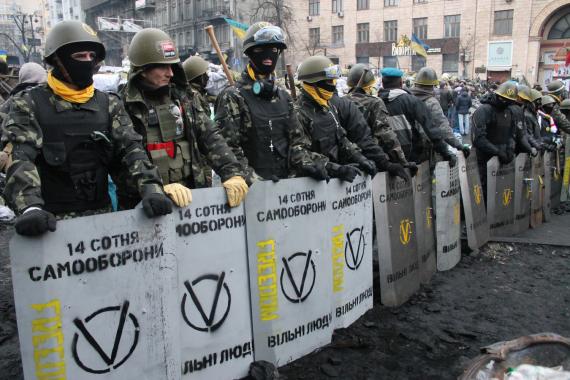This past winter I found myself living in the epicenter of a political revolution. I was ten months into a fourteen-month dissertation project on internationally funded drug treatment programs in Ukraine. Though I was based in the capital city of Kyiv, my research took me all over the country—from rural cities along the Polish border to major ports onthe Crimean coast. At the end of November, however, my research site contracted dramatically, and my only focus was a handful of city blocks in the central district of Kyiv where the EuroMaidan protests emerged and evolved.
Social uprising is incredibly instructive. I did not consider myself an expert in Ukrainian politics when I left Seattle. Nor was I particularly well-versed in Ukrainian criminal procedures, independent media infrastructures, local activist networks, or the variety of recipes and uses for Molotov cocktails. Today I can go toe-to-toe on these topics with any intellectual heavyweight, and, motivated by the largely inaccurate reporting on events in Ukraine, I have made a habit of doing so.
Ukraine’s EuroMaidan has permanently altered my views on anthropology, ethnographic research, and “what I do” in the most fundamental sense. So much of my training at the University of Washington and elsewhere has focused on methods for seeing and navigating the complicated ethics of my research on addiction treatment. Amidst the fast-paced events of the revolution, however, the time and space necessary for this sort of reflection were rarely available. There was no time to develop a plan, to establish methods, to discern the breadth of the ethical implications of my involvement. Yet I continued to document the protests because I was encouraged to do so, and thanked for doing so. Often, I would enter the barricades, camera in hand, and was told by activists where I needed to go, what I needed to see, what events they deemed most important to record. Though conducting research in a popular uprising without an established research plan is an ethical minefield for an anthropologist, it became clear that refusing to bear witness was the least ethical choice I could make.
My understanding of how I, as an anthropologist, am able tocontribute to social activism has also shifted. Although an extremely long research-to-publication window often plagues cultural anthropology, things that I wrote about Ukraine’s EuroMaidan protests were published and widely circulated almost immediately. Despite the years I have spent building a publication record and cultivating a professional audience for my work, my most widely circulated writing, by far, is an update that I posted to Facebook on February 19th. That update has since been cross-posted and reproduced by nearly half-a dozen other blogs and news sites.
The most important lesson I learned at EuroMaidan is the value of simply being there. Anthropological research, by its very nature, allows us to build long-term relationships and put down meaningful roots in the communities where we work. The richness of knowledge and understanding that simply “being there” for the long haul permits a unique intimacy with this small sliver of the human experience. It cultivates a sense of truth that is simultaneously enormously strong and perilously fragile. This type of presence is a privilege to which little else compares.
2014 "Ukraine Roundtable, Part 1." part of the 'What's Going on in Ukraine' collaboration by the Allegra: A Virtual Lab in Legal Anthropology and Anthropoliteia weblogs. March 28.
2014 "From Ukraine: The heartbreak of victory; the fear of Russia"The Seattle Times. March 23.
2014 "Ukraine's EuroMaidan Isn't Just for the Right." Yale Journal of International Affairs. March 18. Cross-posted to the LeftEast weblog.March 19.
2014 "Reflections on Kyiv's EuroMaidan: Ethnography of the Unexpected." Invited article for Anthropology News, published by the American Anthropological Association. March 10.
2014 "UW Student in Kiev Sees Destruction--and Dignity" The Seattle Times. February 21.
2014 "From the Streets of Kyiv: 'We Are Definitely Going Somewhere.'" Invited guest post on the University of Washington Ellison Center weblog. February 20.
2014 "People in the Streets, Bodies in the Snow: Bringing the Stakes of EuroMaidan into Focus."Invited guest post on the University of Washington Ellison Center weblog. January 30.
Photo captions
- A Self Defense brigade stands guard at the barricades holding back police forces on Hrushevskoho st.
- Berkut special forces create a road block, preventing activists from reaching ex-president Viktor Yanukovych's luxury estate.
- A crowd gathers on the barricades where fires are burning to hold police at bay.
- Activists man the innermost barricade on Hrushevskoho st.
